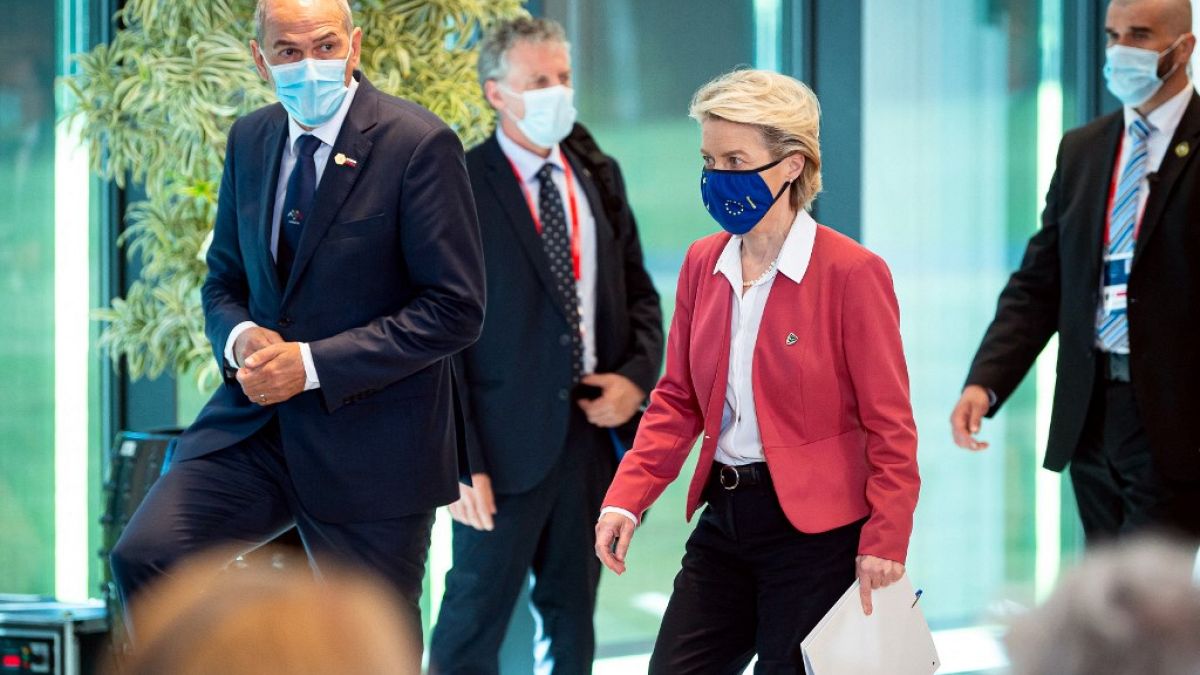From Portugal handing over the baton of the EU's Council presidency to Slovenia to the EU and UK extending the Northern Ireland protocol grace period, here are the top stories in Brussels this week.
This past week saw some big changes in Brussels as Portugal passed on the baton to Slovenia, who now will hold the EU rotating presidency for the next six months.
António Costa, Portuguese Prime Minister, said he didn't have any tips, just an imaginary compass for his Slovenian counterpart.
"I don't give advice. I just gave my colleague, Janez Janša, Prime Minister of Slovenia, a compass, a replica of the compasses used by Portuguese navigators. A navigational instrument is always useful," Costa said.
Slovenia also promises to prioritise the rule of law, but with major concerns over freedom of the media and judiciary within the new Council presidency, all eyes will be on Ljubljana to see if they practice what they preach.
Earlier in the week, a handful of MEPs sent a letter to the European Commission asking them to suspend EU funds to Slovenia for refusing to appoint a candidate to the new European Public Prosecutor's Office, as well as over rule of law issues.
For the moment though, Slovenia is enjoying its moment to shine and welcomed European Commissioners, journalists, and MEPs to the capital this week.
For many, it was the first time they could use their EU Digital COVID Certificate which came into force on Thursday.
One man who is a big fan of this travel certificate is Ryanair boss Michael O'Leary. He told Euronews that his homeland Ireland was a laughing stock in Europe for "mismanaging the recovery" and hopes all European countries will soon be on the same page.
"We have to stop in Europe individual countries imposing stupid or ineffective regulations. We now have the digital COVID cert that allows everybody to arrive, either vaccinated or with a negative PCR, and that should give the Germans the assurance they need."
"Mrs. Merkel's plan for two weeks ago, which was to require visitors to Germany from the UK to quarantine for two weeks, made no sense when the UK is the country with the most vaccinated population in Europe," the businessman explained.
Brexit issues remain
Another issue Slovenia will have to oversee is the EU-UK Northern Ireland protocol talks.
Although it has been five years since the Brexit referendum, and over six months since Brexit really came into force, it is far from over.
This week, the EU granted a three month extension to the grace period for checks on chilled meats, meaning supermarkets in Northern Ireland can, for now, continue to stock sausages and minced meat produced in mainland UK.
The EU Commissioner in charge of Brexit, Maroš Šefčovič, says that the British must find a solution as soon as possible.
“We are not issuing a blank cheque. This solution is of temporary nature in which strong conditions are attached," Šefčovič in Brussels on Wednesday.
For many in the EU bubble, another grace period may have to be given in three months’ time, but what this all shows are the implications of a hard Brexit and the impact it is having on the ground, as Fabian Zuleeg from the European Policy Centre told Euronews.
"Clearly these periods of grace, these periods of extension which have helped up until now to cushion the blow, but we are now seeing already many areas the real impact of Brexit, what it does to trade, what it does to people, to migration and this is going to continue," Zuleeg said.
Another real impact of Brexit is on the millions of EU citizens in the UK. Wednesday was the last day they had to apply for settled status, but with many still remaining to submit their applications, a new scandal could be brewing according to Dr Dora-Olivia Vicol an anthropologist from the University of Oxford.
"I'm worried that this will become another Windrush of the digital type. We've heard from countless people who struggle to apply and actually, my team has been working around the clock this week helping people apply, including three minutes to midnight on the day of the deadline," Vicol told Euronews.
"So we're very worried that a lot of people have not applied. We're also worried that even people who have applied are unable to prove their status because, for the first time, this is a digital-only status. And sometimes they can't do it either because they're struggling with digital literacy or because of the digital system itself is faulty."
